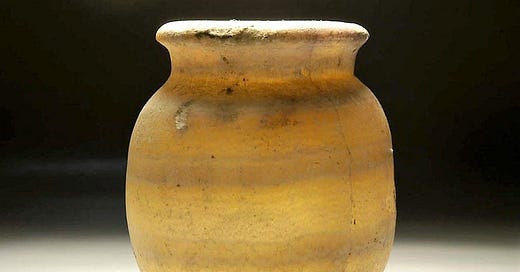Article voiceover
Once upon a time, many years ago, a poet went to church during Lent and listened again to a story she had heard many times before. After church she thought about the story while she waited to catch the bus, and lines of poetry started dancing through her mind. By the time the bus pulled up, she knew they were lines from two different poems about the same story. When she got home, she wrote the poems down.
THE ANOINTING AT BETHANY / I 2001 (Mark 14:3-9) If I cannot be the woman who, crazy with love and courage, tiptoed invisible behind that table of hungry, unseeing men, found him whom her soul loved, whose eyes alone welcomed her, and as if he lay alone before her in a wedding chamber or a grave, washed him with extravagance as pure as passion, as useless as death; if I cannot be the ointment, blessed astringent, green preserver, bright rain and moist dark earth distilled by sun into a leaf, by mortal hands into sweet balm, to sweeten mortal body’s journey back to dust; then let me be an alabaster jar, a kitchen commonplace made fragile by its foolish substance, made hollow for no reason but to contain a gift more precious and more foolish than itself; the moment of being broken its own and only gift, its act of grace.
THE ANOINTING AT BETHANY / II 2001 (Mark 14: 3-9) Here’s what I want to know about the woman who broke the alabaster jar, poured out a riverlet of perfume on his head, drowning the supper smells, the supper conversation: where in God’s name did she or did her family get three hundred coins, a Bethany-sized fortune, to spend on precious oils? And why on earth? Was it some of her marriage-portion, maybe, saved to sweeten her limbs like the bride in Solomon’s song after a wedding feast she never tasted? Or was it left unused after the day her father’s wizened body was laid to earth, or her young son’s — some frail small corpse whose small anointing left her with an empty heart and a full jar? How long had it waited, half-hidden behind clay pots of everyday, how did she know today of every day to reach it down and break it open, how did she know whose head to bless with such a crazy flood of love? The poor you have always with you; some fool is always pouring a life’s treasure over the head of some god, and then the god dies, and another fool is poor. What I want to know is: what was left for her, poor foolish woman, after the jar was broken, perfume poured out, after he said “beautiful” and “remembered,” and disappeared to do what he would do next? How often, after, groping among clay pots of everyday, did she reach for the treasure that was gone? Its absence, his, the promise of a mention in someone’s half-believed tale, was that what she had left? Or did the scent stay on her skin through the washings of everyday, cling to the hands that had stroked the precious oil through his hair, across his forehead, between his own strong fingers, twined willingly with hers, blessing returned for blessing? How poor are you, your treasure spent forever, if you meant to pour it out as surely as your god meant to receive it, if the meaning is the gift?





Oh, Elizabeth. These poems are treasures. Wow.
These are beautiful. Thank you!